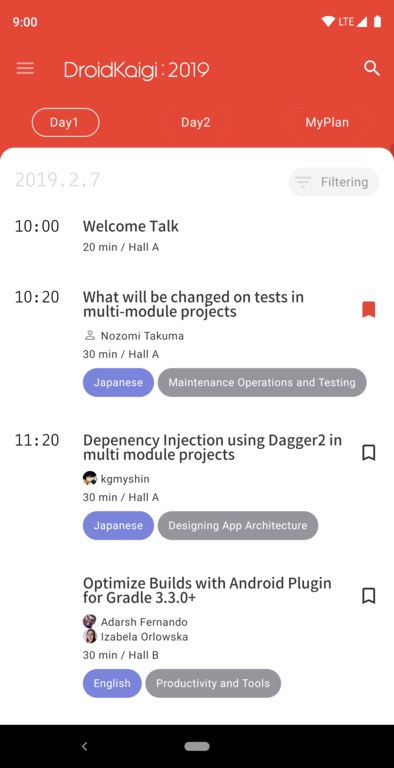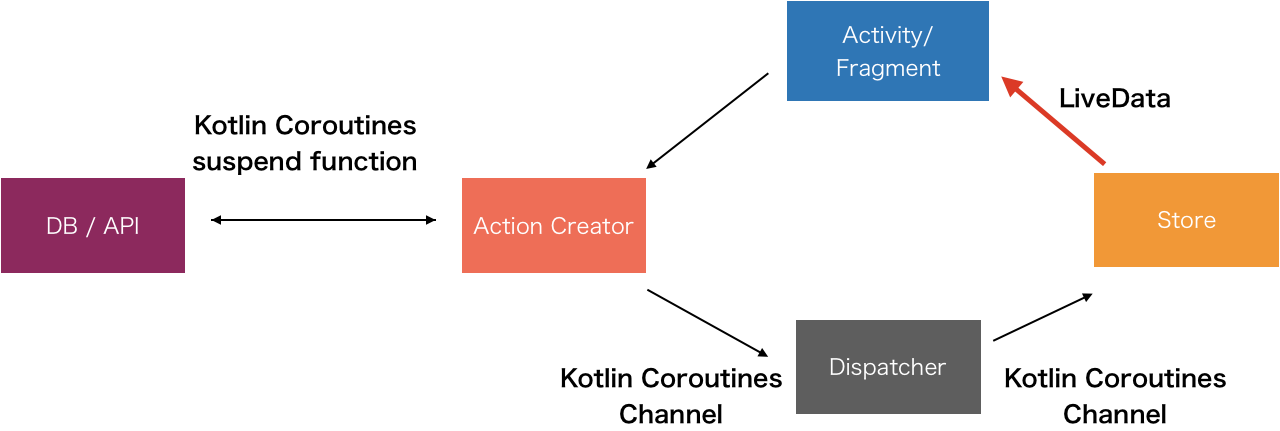 DroidKaigi 2019 official Android app
DroidKaigi 2019 official Android app 
DroidKaigi 2019 is a conference tailored for developers on 7th and 8th February 2019.
You can download the binary built on master branch from
NOTE: Google Play Protect will show a warning dialog on some of devices when installing the current apk. The detailed specification of Google Play Protect is not public so we cannot address this matter. Please ignore the dialog for now. If you cannot install this apk without any error message, please disable Google Play Protect from Google Play Store's menus. Sorry for the inconvenience.
Features
| top | detail |
|---|---|
 |
 |
- View conference schedule and details of each session
- Set notification for upcoming sessions on your preference
- Search sessions and speakers and topics
- Show Information Feed
Contributing
We always welcome any and all contributions! See CONTRIBUTING.md for more information
Requirements
- Android Studio 3.2.1 and higher.
- Android Studio Kotlin Plugin 1.3.11-release-Studio
Check out following status.
Preference > Languages & Frameworks > Kotlin Updates
Older versions of the Kotlin plugin may cause build failures. If you still have a trouble after upgrading the plugin, please try using AndroidStudio 3.3 or 3.4 instead.
Development Environment
Multi module project
We separate the modules for each feature.
You can check generated module dependency diagram
Unidirectional data flow(Flux-based) Architecture
Unidirectional data flow(Flux-based) Architecture with Kotlin Coroutines and AndroidX Libraries(LiveData, ViewModel, Room) DataBinding, Dagger and AssistedInject, Firebase etc.
Groupie
By using Groupie you can simplify the implementation around RecyclerView.
class SpeakerItem @AssistedInject constructor(
@Assisted val speaker: Speaker, // Inject by AssistedInject
val navController: NavController // Inject by Dagger
) : BindableItem<ItemSpeakerBinding>() {
@AssistedInject.Factory
interface Factory {
fun create(
speaker: Speaker
): SpeakerItem
}
override fun getLayout(): Int = R.layout.item_speaker
override fun bind(itemBinding: ItemSpeakerBinding, position: Int) {
itemBinding.speakerText.text = speaker.name
...
}
}We use AssistedInject for creating item.
@Inject lateinit var speakerItemFactory: SpeakerItem.Factory
...
val speakerItems = session
.speakers
.map { speakerItemFactory.create(it) }
groupAdapter.update(speakerItems)Architecture
Unidirectional data flow(Flux-based) Architecture with Kotlin Coroutines and AndroidX Libraries(LiveData, ViewModel, Room) DataBinding, dependency injection, Firebase etc.
Activity/Fragment -> Action Creator
Fragments just call Action Creator's method.
class SessionPagesFragment : DaggerFragment() {
@Inject lateinit var announcementActionCreator: AnnouncementActionCreator
override fun onActivityCreated(savedInstanceState: Bundle?) {
...
announcementActionCreator.load()
}Action Creator <-> DB / API and Action Creator -> dispatcher
Action Creator fetches data from DB / API with Kotlin Coroutines suspend function. And Action Creator dispatches data loaded action and loading state changed actions.
class AnnouncementActionCreator @Inject constructor(
override val dispatcher: Dispatcher,
val firestore: Firestore,
@PageScope val lifecycle: Lifecycle
) : CoroutineScope by lifecycle.coroutineScope,
ErrorHandler {
fun load() = launch {
try {
dispatcher.dispatch(Action.AnnouncementLoadingStateChanged(LoadingState.LOADING))
// fetch announcement by Kotlin Coroutines suspend function
dispatcher.dispatch(Action.AnnouncementLoaded(firestore.getAnnouncements()))
dispatcher.dispatch(Action.AnnouncementLoadingStateChanged(LoadingState.LOADED))
} catch (e: Exception) {
onError(e)
dispatcher.dispatch(Action.AnnouncementLoadingStateChanged(LoadingState.INITIALIZED))
}
}
}Actions are just data holder class.
sealed class Action {
...
class AnnouncementLoadingStateChanged(val loadingState: LoadingState) : Action()
class AnnouncementLoaded(val announcements: List<Announcement>) : Action()
...
}Dispatcher -> Store
Store subscribe dispatcher's action with Kotlin Coroutines channel and transform it to AndroidX LiveData.
This store is a ViewModel. But if the store is used by the whole application(ex: UserStore), you can change the store to a singleton.
class AnnouncementStore @Inject constructor(
dispatcher: Dispatcher
) : ViewModel() {
val loadingState: LiveData<LoadingState> = dispatcher
.subscribe<Action.AnnouncementLoadingStateChanged>()
.map { it.loadingState }
.toLiveData(LoadingState.LOADING)
val announcements: LiveData<List<Announcement>> = dispatcher
.subscribe<Action.AnnouncementLoaded>()
.map { it.announcements }
.toLiveData(listOf())
}Store -> Activity/Fragment
In the fragment, we can observe Store's LiveData. You can display the UI with LiveData.
override fun onActivityCreated(savedInstanceState: Bundle?) {
...
announcementStore.loadingState.changed(viewLifecycleOwner) {
// apply loading state for progress bar
progressTimeLatch.loading = it == LoadingState.LOADING
}
announcementStore.announcements.changed(viewLifecycleOwner) { announcements ->
// we can show UI with announcements
}
...Thanks
Thank you for contributing!
- Contributors
- Designer
- App Distribution
- DeployGate (https://deploygate.com)
Credit
This project uses some modern Android libraries and source codes.
- Android Jetpack (Google)
- Foundation
- AppCompat
- Android KTX
- Mutidex
- Test
- Architecture
- Data Binding
- Lifecycles
- LiveData
- Navigation
- UI
- Emoji
- Fragment
- Transition
- ConstraintLayout
- RecyclerView
- ...
- Foundation
- Kotlin (Jetbrains)
- Stdlib
- Coroutines
- Serialization
- Firebase (Google)
- Authentication
- Cloud Firestore
- Dagger 2
- Core (Google)
- AndroidSupport (Google)
- AssistedInject (Square)
- Material Components for Android (Google)
- Ktor (Jetbrains)
- Android Client
- Json
- OkHttp (Square)
- Client
- LoggingInterceptor
- livedata-ktx (Shopify)
- LeakCanary (Square)
- Stetho (Facebook)
- Hyperion-Android (WillowTree)
- Groupie (lisawray)
- KLOCK (soywiz)
- MockK (oleksiyp)
- Injected ViewModel Provider (evant)
- Google I/O 2018 (Google)
- Picasso (Square)





